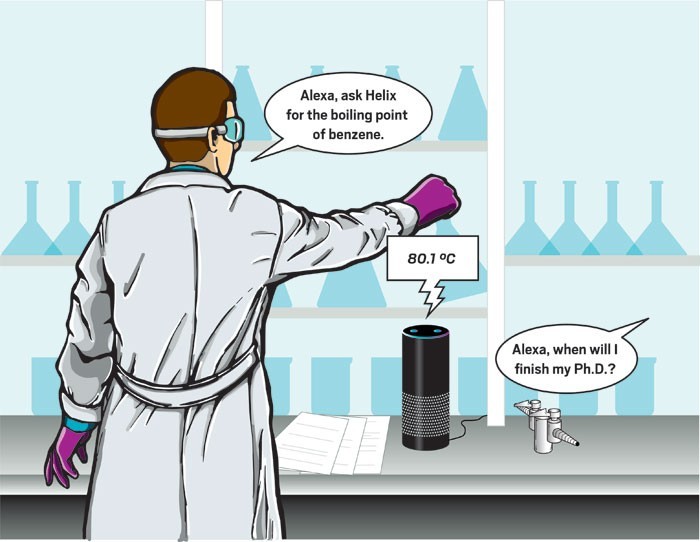Amazon's digital assistant Alexa was turned into an assistant in a science lab.

Illustration of the capabilities of the Alexa digital assistant when working in the laboratory. Of course, the system cannot predict the future, but it is quite capable of helping in the present.
Digital assistants, which is becoming more and more, can do a lot. Processing information using the "cloud" they allow you to quickly get an answer to your question. And these questions can be very different - from simple ones, like “Who is the president of Venezuela now?” To more complex ones, for example, “What is titration?”. Software and hardware platforms that belong to the category of digital assistants already have Amazon, Google, Apple and some other companies.
In some cases, virtual assistants may be indispensable. Well, for example, in the kitchen, when searching for suitable ingredients for pilaf with a quantitative indication of the different elements of the recipe. Likewise, a digital assistant like Amazon from Amazon can be an audio reference in a scientist’s lab. And this is quite real - not so long ago, a software developer named James Rode modified Alexa a little, teaching her to help her wife, a microbiologist by profession.
James added a special feature for Alexa, which is called Helix . A new opportunity has turned a digital assistant into an assistant scientist who is able at any time to obtain the necessary information about the microbiologist of interest. All other functions of the device also remain available. In order to access the scientific function of Alexa, you need to say the following: "Alexa, ask Helix what you need to carry out the synthesis reaction." After that, the system starts working and after a couple of seconds, Amazon Echo, a smart Amazon column with an integrated Alexa assistant, tells you what to do and how. It is clear that the system requires an internet connection. Without this, the column will not work, or rather, it will, but its functionality is severely limited.
')
As for the laboratory use of Alexa, it is a question of reading out the methodology for conducting an experiment while the experimenter is busy preparing for the experience itself. Or, a scientist can request the necessary quantities of the reagents for the experiment, the melting point of a substance, any type of calculation, etc. The software has already been tested in the laboratory, and the results are presented at a meeting of the American Chemical Society. The development has earned a positive assessment of scientists.
Of course, the emergence of a virtual assistant in the laboratory can not be called a technological breakthrough, since modern scientists use the latest technologies, including the Internet of things, Microsoft Kinect cameras or virtual reality. But such a digital assistant can be useful to a scientist in his daily work. In most cases, scientists have to collect something on their own, but here is a ready-made platform that needs only a little refinement to fit your needs.
Helix is currently at the stage of proof-of-concept . But the platform is open, so anyone can try , of course, if he (or she) has Amazon Echo with Alexa. Now Amazon Echo and her (or him?) Younger brother Echo Dot are priced at $ 180 and $ 50 respectively.
By the way, these devices are finding an increasing number of applications. After the system was released in 2014, few people understood why this is and in what cases such a device can be used. Even the advanced tech blogs didn’t understand right away and called Echo a “column”. Yes, of course, you can listen to music with the help of this device, but the range of its capabilities is much wider, as James and his wife proved. In the meantime, Echo gradually disperse around the world - only last year about 7 million such devices were sold.
But back to the lab. So, a programmer and a microbiologist downloaded several techniques of conducting experiments of various types into the memory of the device, which greatly facilitates the work of a specialist. Other scientists are already eyeing this development, planning to use it for their own purposes.

“My colleague had previously suggested using Alexa to help in the lab, but we are not computer scientists,” says chemist Elizabeth Meucci of the University of Michigan. Meucci, after learning about the new development, decided to try out the software platform and Echo in work. She says that scientists can use this complex as, for example, a laboratory journal, dictating the course of work during an experiment. Of course, the scientific program of such an experiment will depend on the specialization of the scientist and his goals. Helix can be useful, first of all, for small laboratories with 3-5 employees. So far, the ability to scale Helix is quite difficult.
Helix developer James Rode plans to offer his development to familiar scientists already this summer, in order for them to appreciate the advantages and disadvantages of the system, suggesting what else you can add.
Source: https://habr.com/ru/post/403747/
All Articles